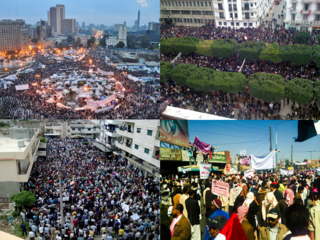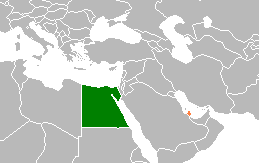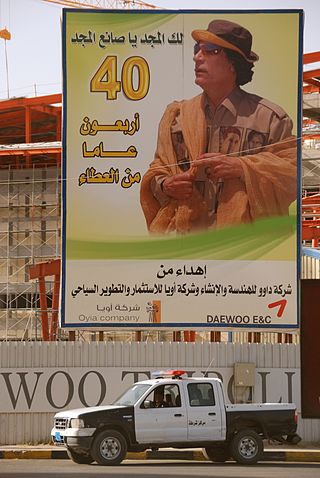Related Research Articles

Muammar Muhammad Abu Minyar al-Gaddafi, also known as Colonel Gaddafi, was a Libyan politician, revolutionary, and political theorist. He was the de facto leader of Libya from 1969 to 2011, first as Revolutionary Chairman of the Libyan Arab Republic from 1969 to 1977 and then as the Brotherly Leader of the Great Socialist People's Libyan Arab Jamahiriya from 1977 to 2011. Initially ideologically committed to Arab nationalism and Arab socialism, he later ruled according to his own Third International Theory.

Arab League–Iran relations refer to the political, economic, and cultural ties between the League of Arab States and the Islamic Republic of Iran. The former is a regional organization composed of 22 Arab states in MENA with a combined majority of Sunni Muslims, whereas the latter is a country in Western Asia with a majority of Shia Muslims.
The Arab Union is a theoretical political union of the Arab states. The term was first used when the British Empire promised the Arabs a united independent state in return for revolting against the Ottoman Empire, with whom Britain was at war. It never came to fruition following the Sykes–Picot Agreement. Despite this, many in the Arab world have since called for the creation of a pan-Arab state. Egyptian President Gamal Abdel Nasser made several unsuccessful attempts to unite Egypt with other Arab countries, and briefly succeeded in forming the United Arab Republic with Syria in 1958, which dissolved in 1971. Similar attempts were made by other Arab leaders, such as Hafez al-Assad, Ahmed Hassan al-Bakr, Faisal I of Iraq, Muammar Gaddafi, Saddam Hussein, Gaafar Nimeiry and Anwar Sadat.

After the neighboring countries of Egypt and Libya both gained independence in the early 1950s, Egypt–Libya relations were initially cooperative. Libya assisted Egypt in the 1973 Arab-Israeli War. Later, tensions arose due to Egypt's rapprochement with the west. Following the 1977 Egyptian–Libyan War, relations were suspended for twelve years. However, since 1989 relations have steadily improved. With the progressive lifting of UN and US sanctions on Libya from 2003 to 2008, the two countries have been working together to jointly develop their oil and natural gas industries.

The 1964 Arab League summit in Alexandria was held on 11 September 1964 in Montaza Palace, Alexandria as the second Arab League Summit. The focus of the conference was to implement the plans discussed at the first Arab League summit held in January of that year. The summit was notable for being a key step in the buildup to the Six-Day War in 1967 and separately for "approving the establishment of the Palestine Liberation Organization."

Saudi Arabia – United Arab Emirates relations refers to the current and historical relationship between Saudi Arabia and the United Arab Emirates. Saudi Arabia maintains an embassy in Abu Dhabi and a consulate in Dubai while the U.A.E. has an embassy in Riyadh and consulate in Jeddah. Both countries are neighbours and as part of the Middle East and Persian Gulf region, share extensive political and cultural ties.
These are some of the notable events relating to politics in 2011.

The Arab Spring was a series of anti-government protests, uprisings and armed rebellions that spread across much of the Arab world in the early 2010s. It began in Tunisia in response to corruption and economic stagnation. From Tunisia, the protests then spread to five other countries: Libya, Egypt, Yemen, Syria and Bahrain. Rulers were deposed or major uprisings and social violence occurred including riots, civil wars, or insurgencies. Sustained street demonstrations took place in Morocco, Iraq, Algeria, Lebanon, Jordan, Kuwait, Oman and Sudan. Minor protests took place in Djibouti, Mauritania, Palestine, Saudi Arabia and the Moroccan-occupied Western Sahara. A major slogan of the demonstrators in the Arab world is ash-shaʻb yurīd isqāṭ an-niẓām!.
The international reactions to the Arab Spring have been disparate, including calls for expanded liberties and civil rights in many authoritarian countries of the Middle East and North Africa in late 2010 and 2011.
Abdelhakim Belhaj is a Libyan politician and military leader. He is the leader of the Islamist al-Watan Party and former head of the Tripoli Military Council. He was the emir of the defunct Libyan Islamic Fighting Group, an anti-Gaddafi guerrilla group.

Dr. Ali Muhammad al-Sallabi, or al-Salabi is a Muslim historian, religious scholar and Islamist politician from Libya. He was arrested by the Gaddafi regime, then left Libya and studied Islam in Saudi Arabia and Sudan during the 1990s. He then studied in Qatar under Yusuf al-Qaradawi and returned to Libya during the 2011 overthrow of Gaddafi and distributed weapons, money, and aid to Islamist groups in the country. His actions were criticized by members of the internationally recognized Libyan government under the National Transitional Council who he in turn criticized as being secular.
The following lists events that happened in 2014 in Libya.

Egypt–Qatar relations are the bilateral relations between the State of Qatar and the Arab Republic of Egypt. They first began in 1972.
Qatar has been accused of allowing terror financiers to operate within its borders, which has been one of the justifications for the Qatar diplomatic crisis that started in 2017 and ended in 2021. In 2014, David S. Cohen, then United States Under Secretary of the Treasury for Terrorism and Financial Intelligence, accused Qatari authorities of allowing financiers who were on international blacklists to live freely in the country: "There are U.S.- and UN-designated terrorist financiers in Qatar that have not been acted against under Qatari law." Accusations come from a wide variety of sources including intelligence reports, government officials, and journalists.

The Qatar–Saudi Arabia diplomatic conflict refers to the ongoing struggle for regional influence between Qatar and the Kingdom of Saudi Arabia (KSA), both of which are members of the Gulf Cooperation Council (GCC). It is sometimes called the New Arab Cold War. Bilateral relations are especially strained since the beginning of the Arab Spring, that left a power vacuum both states sought to fill, with Qatar being supportive of the revolutionary wave and Saudi Arabia opposing it. Both states are allies of the United States, and have avoided direct conflict with one another.

The 40th anniversary of the Libyan Revolution was a ruby jubilee anniversary in the Great Socialist People's Libyan Arab Jamahiriya celebrated on 1 September 2009 in honor of the 1969 Libyan coup d'état.
Libyan–Saudi Arabian relations refers to the current and historical relations between Libya and Saudi Arabia. Libya has an embassy in Riyadh and Saudi Arabia has an embassy in Tripoli, though the Saudi embassy has closed since 2015.

The 2022 Arab League summit, officially the 31st Ordinary Session of the Council of the League of Arab States at the Summit Level, was held at its 31st session in Algiers. This was the fourth time the city hosted this event. All Arab countries were represented at the event, with the exception of Syria, which has been suspended since 2011 due to the ongoing crisis. The summit was postponed several times before its date was confirmed on 1 November 2022. It was initially to be held in 2020, 2021 and finally March 2022. But due to the COVID-19 pandemic, it was postponed to November to coincide with the anniversary of the outbreak of the Algerian Revolution. The summit was also the first since a number of countries normalized relations with Israel, causing a schism in the Arab position, which had remained united over what was stipulated in the Beirut 2002 initiative.
The 2005 Arab League summit, officially 17th Ordinary Session of the Council of the League of Arab States at the Summit Level, was a regular summit that was held in Algiers, Algeria in March 2005. The city hosted the summit for the third time, following 1973 and 1988. Prior to the conference, the foreign ministers met to agree on proposals that will be presented to the leaders for approval. The Palestinian issue, the unrest in Lebanon and Iraq, Egypt's bid for a permanent seat on the Security Council, and political reform in the member nations were all topics of discussion at the summit.
References
- ↑ Murphy, Brian (March 30, 2009). "Sudan's Leader Arrives in Qatar". The Washington Post.
- ↑ Hu Dandan and Liao Zhenyun. "What is behind Egyptian President Mubarak's absence from Arab Summit?". Xinhua. Archived from the original on April 1, 2009. Retrieved February 14, 2014.
- ↑ Adel Darwish (March 30, 2009). "Muammar Gaddafi accuses Saudi Arabia's King Abdullah of lying at Arab summit". The Telegraph . Retrieved February 14, 2014.
- ↑ "Libya's Gadhafi storms out of Arab summit". NDTV (Associated Press). March 30, 2009. Retrieved February 14, 2014.
- ↑ "Libya's Kadhafi hurls apologies to Saudi king". Archived from the original on June 18, 2009. Retrieved June 21, 2009.